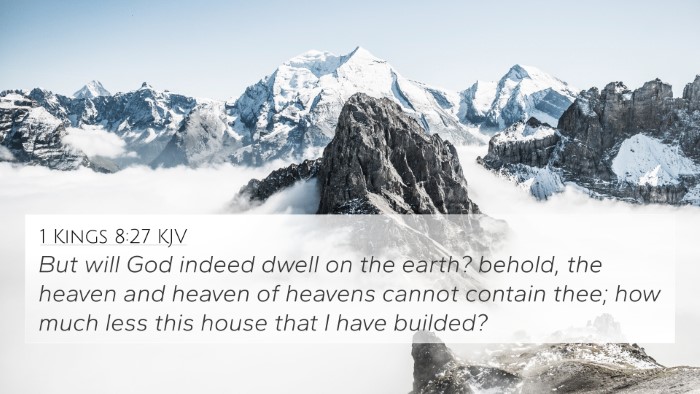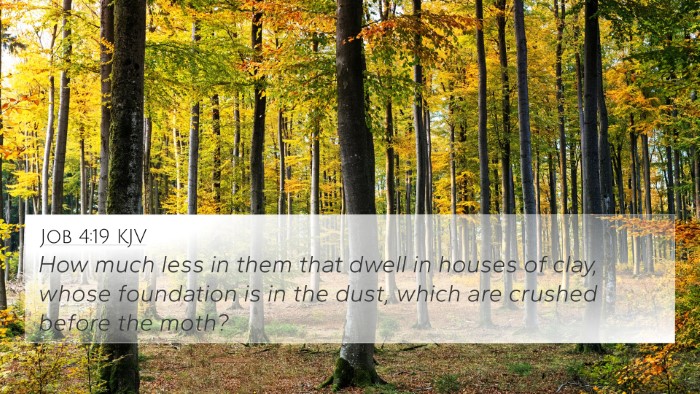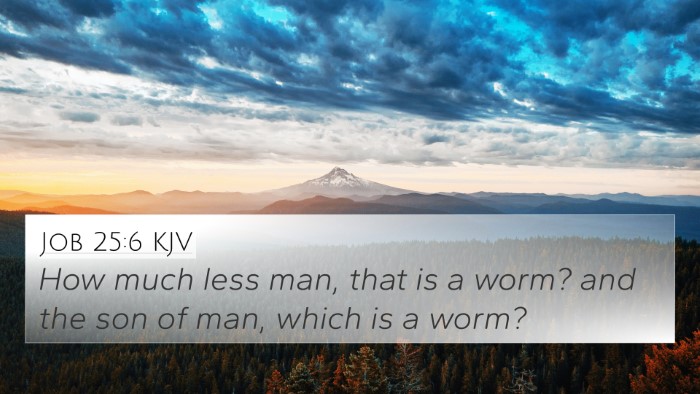Understanding Job 9:14
Job 9:14 reads: "How much less shall I answer him, and choose out my words to reason with him?" This verse encompasses the profound humility and reverence that Job feels in the presence of God, highlighting the difficulty of contending with divine wisdom and majesty.
Meaning and Interpretation
This verse showcases Job's awareness of his lowly position before God. It draws attention to the idea that human understanding is vastly insufficient when compared to God's infinite wisdom. This reflects a theme prevalent throughout the Book of Job, where the protagonist grapples with his suffering while trying to understand God's purpose.
Commentary Insights
Matthew Henry's Commentary
Matthew Henry emphasizes that Job recognizes the futility of arguing with God. According to Henry, Job's rhetorical question illustrates the profound gap between divine authority and human reasoning. Henry notes that Job, despite his sufferings, acknowledges that questioning God’s justice is misplaced, for God is inherently above our understanding.
Albert Barnes' Commentary
In Barnes' view, Job’s contemplation conveys a deep sense of submission. Job realizes that any response to God would be inadequate, pointing out that the wise and holy God cannot be countered by flawed human logic. Barnes stresses that Job's approach reflects a penitential heart, understanding that God's wisdom surpasses all human arguments.
Adam Clarke's Commentary
Adam Clarke elaborates on the nature of Job’s despair. He notes that Job is not disputing God’s goodness but is rather overwhelmed by the sheer magnitude of divine power and the mystery of suffering. Clarke identifies this verse as pivotal, underscoring the theme of humility before God and the recognition of human limitations.
Related Bible Cross References
- Isaiah 40:13-14: "Who has directed the Spirit of the LORD, or as His counselor has taught Him?" Highlights God's unmatched wisdom.
- Proverbs 3:5-6: "Trust in the LORD with all your heart, and lean not on your own understanding." Encourages reliance on God over human reasoning.
- Romans 11:33: "Oh, the depth of the riches both of the wisdom and knowledge of God!" Celebrates God's profound wisdom.
- Job 40:4-5: "Behold, I am vile; what shall I answer You? I lay my hand over my mouth." Job expresses his unworthiness before God.
- Psalm 139:6: "Such knowledge is too wonderful for me; it is high, I cannot attain it." Acknowledges the limits of human understanding.
- Jeremiah 10:23: "O LORD, I know the way of man is not in himself; it is not in man who walks to direct his own steps." Reflects on the need for divine guidance.
- Ecclesiastes 5:2: "Do not be rash with your mouth, and let not your heart utter anything hastily before God." Advises caution in speaking to God.
Connecting Themes
Job 9:14 connects powerfully to themes of submission, humility, and the greatness of God. Through cross-referencing these verses, we observe a thematic connection between the experiences of Job and the overall biblical narrative surrounding the nature of God’s understanding versus human comprehension.
Comparative Bible Verse Analysis
By analyzing Job 9:14 alongside these related verses, we can enrich our understanding of Job's plight in the context of scriptural teachings on divine wisdom. This comparative approach illustrates the inter-Biblical dialogue that emerges when exploring the overarching messages of submission and divine comprehension.
Tools for Bible Cross-Referencing
Using tools like a Bible concordance or a cross-reference Bible study guide can be invaluable when exploring connections between Bible verses. These resources provide insights into linking Bible scriptures and identifying themes that can support sermon preparation or personal study.
Conclusion
Job 9:14 serves as a profound reminder of the limitations of human understanding in confronting divine wisdom. The insights from various commentaries, coupled with related scripture references, illustrate the rich tapestry of themes surrounding humility and reverence towards God. By engaging in cross-referencing, one can uncover deeper meanings and connections that enhance one’s spiritual journey.










